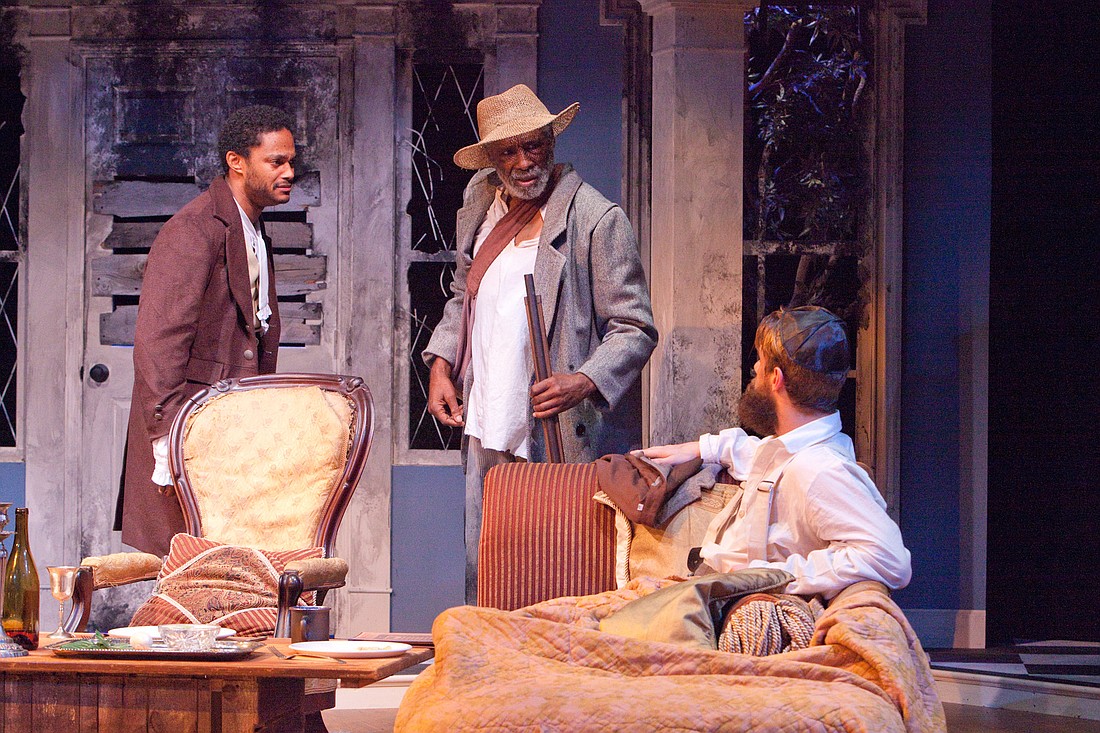- November 26, 2024
-
-
Loading

Loading

The Westcoast Black Theatre Troupe’s current production of Matthew Lopez’s “The Whipping Man” takes audiences to a Passover like no other. Why is this Passover different from all other Passovers? In nearly every way imaginable.
It takes place in April 1865, right after the Civil War, in a looted, half-burned plantation outside Richmond, Va. Caleb, a wounded Jewish Confederate soldier (Drew Foster), returns to reunite with two of his former slaves, Simon (Taurean Blacque) and John (Robert Douglas). For reasons we later discover, Caleb doesn’t want to go to a military hospital. As a result, the ex-slaves amputate his gangrenous leg in a gripping, unforgettable scene.
Caleb survives. Passover rolls around. Simon insists that everyone participate — the former slaves included, who are both converts to Judaism. Ironically, ex-slaves and an ex-slave owner will now commemorate the freeing of the slaves — both the Exodus in the Bible and the Emancipation in the reunited United States.
The ceremony goes on, with stolen wine and hardtack and collard greens standing in for matzo and bitter herbs. That may sound like a feel-good moment. But the bitter past catches up with the present. (For details, you’ll need to see the play.)
Without offering spoilers, I can say that the journey to freedom always takes a miracle, and miracles don’t always come. Either way, it’s never easy. Lopez doesn’t sugarcoat the pain.
The playwright’s structure is inventive and daring. In some ways, it’s a bottle story with all the action confined to one claustrophobic space. In another sense, it’s a memory play. Caleb, Simon and John have little else to do but tell stories — which Passover is, among other things. On top of that, there’s a ticking time bomb of secrets and bad karma. The plantation’s island of safety is only temporary. It all adds up to double dose of suspense and heartbreak. Freedom may or may not be waiting down the road. For now, there’s a day of reckoning and pain.
Lopez’s play is an emotional wringer. Director Howard Millman never hesitates when it’s time to put audiences through it. He makes you feel every drop of emotion. But it’s honest emotion, unfolding from the hearts and minds of believable characters. Under his direction, nothing ever feels like an effect. Instead, he makes you feel like you’re there, in a specific place and time. The aftermath of the Civil War isn’t safely tucked away in a history book. It feels like it’s happening now.
Blacque’s performance as Simon has a true gravitas; he’s particularly moving interspersing “Let My People Go” with the Haggadah. Moral authority and the reality principle are both on Simon’s side. His character rarely raises his voice; he knows he doesn’t have to. Douglas’ John is a rebel in a world he never made — a world, until recently, populated by so-called Rebels fighting for the right to keep other people in chains. Foster’s Caleb is a good Jew in a bad world. Passover puts his moral contradictions and evasions in his face. Whatever liberation Caleb may experience, you know he’s already left parts of himself behind.
Lopez’s “The Whipping Man” has the same moral authority as Athol Fugard’s work challenging the abuses of Apartheid in South Africa. Like Fugard, Lopez confronts us with a simple, unsentimental truth: Whips leave scars. Closing your eyes doesn’t make them go away. This West Coast Black Theatre Troupe production asks us to keep our eyes open and see the damage done. Seeing the reality of human bondage always hurts. But the journey to freedom always starts there.
IF YOU GO
“The Whipping Man” runs through Feb. 2, at Westcoast Black Theatre Troupe, 1646 10th Way, Sarasota. Call 366-1505 or visit wbttroupe.org for more information.